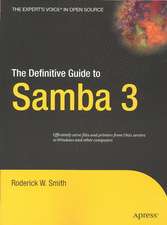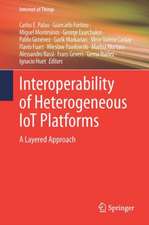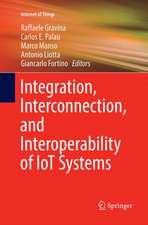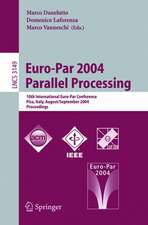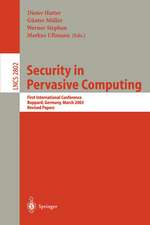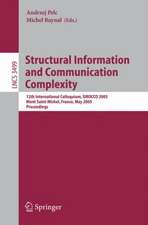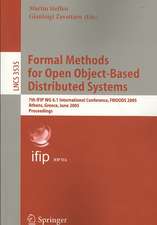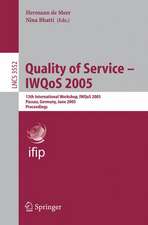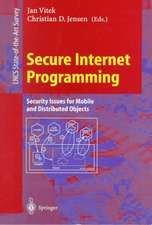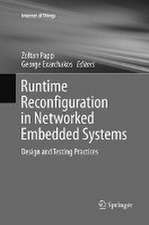Networks for Pervasive Services: Six Ways to Upgrade the Internet: Lecture Notes in Electrical Engineering, cartea 92
Autor Antonio Liotta, George Exarchakosen Limba Engleză Paperback – 15 iul 2013
| Toate formatele și edițiile | Preț | Express |
|---|---|---|
| Paperback (1) | 640.05 lei 6-8 săpt. | |
| SPRINGER NETHERLANDS – 15 iul 2013 | 640.05 lei 6-8 săpt. | |
| Hardback (1) | 644.33 lei 6-8 săpt. | |
| SPRINGER NETHERLANDS – 14 mai 2011 | 644.33 lei 6-8 săpt. |
Din seria Lecture Notes in Electrical Engineering
- 18%
 Preț: 1859.04 lei
Preț: 1859.04 lei - 18%
 Preț: 895.27 lei
Preț: 895.27 lei - 17%
 Preț: 397.66 lei
Preț: 397.66 lei - 18%
 Preț: 1562.17 lei
Preț: 1562.17 lei - 20%
 Preț: 1473.39 lei
Preț: 1473.39 lei - 18%
 Preț: 5169.60 lei
Preț: 5169.60 lei - 20%
 Preț: 1741.49 lei
Preț: 1741.49 lei - 20%
 Preț: 1918.04 lei
Preț: 1918.04 lei - 18%
 Preț: 1573.20 lei
Preț: 1573.20 lei - 18%
 Preț: 1851.77 lei
Preț: 1851.77 lei - 18%
 Preț: 1578.72 lei
Preț: 1578.72 lei - 18%
 Preț: 1903.08 lei
Preț: 1903.08 lei - 18%
 Preț: 2113.02 lei
Preț: 2113.02 lei - 18%
 Preț: 892.42 lei
Preț: 892.42 lei - 18%
 Preț: 1404.30 lei
Preț: 1404.30 lei - 18%
 Preț: 1133.61 lei
Preț: 1133.61 lei - 18%
 Preț: 1847.84 lei
Preț: 1847.84 lei - 18%
 Preț: 1384.56 lei
Preț: 1384.56 lei - 20%
 Preț: 1300.14 lei
Preț: 1300.14 lei - 20%
 Preț: 1174.76 lei
Preț: 1174.76 lei - 20%
 Preț: 1310.03 lei
Preț: 1310.03 lei - 18%
 Preț: 2546.29 lei
Preț: 2546.29 lei - 20%
 Preț: 1310.03 lei
Preț: 1310.03 lei - 18%
 Preț: 1676.58 lei
Preț: 1676.58 lei - 20%
 Preț: 1182.20 lei
Preț: 1182.20 lei - 18%
 Preț: 1392.46 lei
Preț: 1392.46 lei - 18%
 Preț: 1119.38 lei
Preț: 1119.38 lei - 18%
 Preț: 1678.16 lei
Preț: 1678.16 lei - 18%
 Preț: 1596.85 lei
Preț: 1596.85 lei - 18%
 Preț: 1398.00 lei
Preț: 1398.00 lei - 20%
 Preț: 1445.35 lei
Preț: 1445.35 lei - 18%
 Preț: 1244.89 lei
Preț: 1244.89 lei - 20%
 Preț: 1173.10 lei
Preț: 1173.10 lei - 18%
 Preț: 810.81 lei
Preț: 810.81 lei - 20%
 Preț: 1173.93 lei
Preț: 1173.93 lei - 20%
 Preț: 1482.47 lei
Preț: 1482.47 lei - 20%
 Preț: 1915.57 lei
Preț: 1915.57 lei - 18%
 Preț: 1387.73 lei
Preț: 1387.73 lei - 18%
 Preț: 1425.62 lei
Preț: 1425.62 lei - 20%
 Preț: 1297.67 lei
Preț: 1297.67 lei - 18%
 Preț: 1407.46 lei
Preț: 1407.46 lei - 18%
 Preț: 1667.91 lei
Preț: 1667.91 lei - 18%
 Preț: 1400.35 lei
Preț: 1400.35 lei - 18%
 Preț: 1117.03 lei
Preț: 1117.03 lei - 18%
 Preț: 1573.20 lei
Preț: 1573.20 lei - 18%
 Preț: 1405.90 lei
Preț: 1405.90 lei - 18%
 Preț: 726.37 lei
Preț: 726.37 lei - 18%
 Preț: 1405.90 lei
Preț: 1405.90 lei - 18%
 Preț: 1238.56 lei
Preț: 1238.56 lei - 18%
 Preț: 725.61 lei
Preț: 725.61 lei
Preț: 640.05 lei
Preț vechi: 800.06 lei
-20% Nou
Puncte Express: 960
Preț estimativ în valută:
122.49€ • 127.10$ • 102.38£
122.49€ • 127.10$ • 102.38£
Carte tipărită la comandă
Livrare economică 15-29 martie
Preluare comenzi: 021 569.72.76
Specificații
ISBN-13: 9789400736108
ISBN-10: 940073610X
Pagini: 180
Ilustrații: XVIII, 162 p.
Dimensiuni: 155 x 235 x 9 mm
Greutate: 0.27 kg
Ediția:2011
Editura: SPRINGER NETHERLANDS
Colecția Springer
Seria Lecture Notes in Electrical Engineering
Locul publicării:Dordrecht, Netherlands
ISBN-10: 940073610X
Pagini: 180
Ilustrații: XVIII, 162 p.
Dimensiuni: 155 x 235 x 9 mm
Greutate: 0.27 kg
Ediția:2011
Editura: SPRINGER NETHERLANDS
Colecția Springer
Seria Lecture Notes in Electrical Engineering
Locul publicării:Dordrecht, Netherlands
Public țintă
GraduateCuprins
Foreword.- Preface.- Acknowledgements.- Ch 1 On the Way to the Pervasive Web.- Ch 2 The Network, as We Know It.- Ch 3 Six Problems for the Service Provider.- Ch 4 Spontaneous Networks.-
Ch 5 Reactive Networks.- Ch 6 Proactive Networks.- Ch 7 Content-aware Networks.- Ch 8 Distribution-efficient Networks.- Ch 9 Discovering Virtual Resources.- Ch 10 A Peek at the Future Internet.
Index.
Ch 5 Reactive Networks.- Ch 6 Proactive Networks.- Ch 7 Content-aware Networks.- Ch 8 Distribution-efficient Networks.- Ch 9 Discovering Virtual Resources.- Ch 10 A Peek at the Future Internet.
Index.
Recenzii
From the reviews:
“In this book, Antonio Liotta and George Exarchakos have successfully tackled the challenge of explaining in easy to understand terms how the Internet works today and how it could be upgraded. The first two chapters of the book deal with how the Internet works today. The next seven chapters deal with how it could be upgraded … . I strongly recommend the book to non networking specialists who are not ‘dummies,’ but have a keen interest in the Internet and its evolution.” (Roch Glitho, IEEE Communications Magazine, February, 2012)
“This book presents the old and well-known concepts so that readers can understand them. This is helpful, since no computer network expert knows all of the concepts. … The book is quite instructive and timely, and presents all concepts, both new and existing. … an interesting read for students, or for those who are interested in computer networks but don’t have the technical knowledge. Professionals and researchers in the computer networking field will also find the book interesting, as it offers new ideas and discussions.” (Kalinka Castelo Branco, ACM Computing Reviews, September, 2011)
“In this book, Antonio Liotta and George Exarchakos have successfully tackled the challenge of explaining in easy to understand terms how the Internet works today and how it could be upgraded. The first two chapters of the book deal with how the Internet works today. The next seven chapters deal with how it could be upgraded … . I strongly recommend the book to non networking specialists who are not ‘dummies,’ but have a keen interest in the Internet and its evolution.” (Roch Glitho, IEEE Communications Magazine, February, 2012)
“This book presents the old and well-known concepts so that readers can understand them. This is helpful, since no computer network expert knows all of the concepts. … The book is quite instructive and timely, and presents all concepts, both new and existing. … an interesting read for students, or for those who are interested in computer networks but don’t have the technical knowledge. Professionals and researchers in the computer networking field will also find the book interesting, as it offers new ideas and discussions.” (Kalinka Castelo Branco, ACM Computing Reviews, September, 2011)
Textul de pe ultima copertă
<< Beautifully written, this book takes the reader on a compelling tour of the state of affairs in today’s Internet and the challenges it faces for supporting pervasive services of tomorrow. The approach adopted by the authors looks at the big picture, discussing the evolution of the Internet from a rigidly defined layered architecture to an interactive multi-faceted system providing, beyond connectivity, a more generative next-generation network infrastructure. In this context, the authors describe a selection of some of the prominent network mechanisms that may help in shaping the architecture of the future Internet. Overall, this book is informative, enjoyable, and an excellent reference source for every student, network professional, or researcher interested in the post-Internet era. >>
Prof. Raouf Boutaba, University of Waterloo (Canada)
Since its inception in the 1970s the Internet has become larger, faster and wireless. It is the biggest machine ever built, the “generative” engine of our digital society. However, the software that runs the global network has not seen any substantial upgrade since the early 1990s. It is now evident that the existing mechanisms that transport data around the Internet are no longer adequate for the new breed of Web applications. This book explains why the time is ripe for a complete overhaul in view of the Future Internet. Through a series of simple examples, the authors present a wealth of network mechanisms, starting from those that sustain the Web today. Readers will become familiar with a range of advanced protocols that will make the Internet more ubiquitous, reactive, proactive, information-driven, distribution-efficient and searchable. This book presents a selection of remarkable research ideas, making them accessible to the non-specialist reader.
Prof. Raouf Boutaba, University of Waterloo (Canada)
Since its inception in the 1970s the Internet has become larger, faster and wireless. It is the biggest machine ever built, the “generative” engine of our digital society. However, the software that runs the global network has not seen any substantial upgrade since the early 1990s. It is now evident that the existing mechanisms that transport data around the Internet are no longer adequate for the new breed of Web applications. This book explains why the time is ripe for a complete overhaul in view of the Future Internet. Through a series of simple examples, the authors present a wealth of network mechanisms, starting from those that sustain the Web today. Readers will become familiar with a range of advanced protocols that will make the Internet more ubiquitous, reactive, proactive, information-driven, distribution-efficient and searchable. This book presents a selection of remarkable research ideas, making them accessible to the non-specialist reader.
Caracteristici
Pinpoints the shortcomings of today's Internet, giving an outlook for the Future Internet research Includes over a hundred illustrated scenarios which make advanced networking concepts accessible to a broader readership Presents simple yet effective protocols for the construction of complex, self-organizing networks Includes supplementary material: sn.pub/extras






